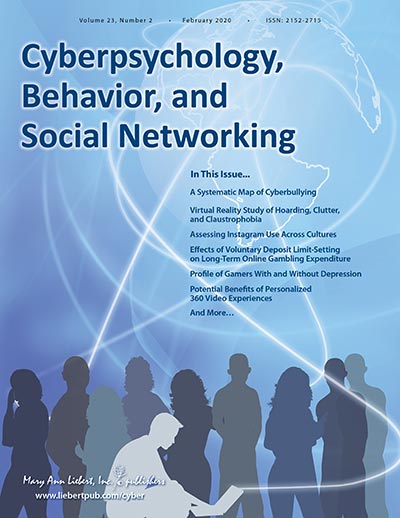For Immediate Release
Can 360 Video Experiences Benefit Affect?
Contact: Kathryn Ryan
914-740-2250
kryan@liebertpub.com

New Rochelle, NY, February 25, 2020—A new study has shown that experiencing personalized experiences in a virtual reality setting can improve affect among university students. The study, which also showed that the use of personalized 360 video experiences is feasible for use in hospitalized patients to improve affect, is published in Cyberpsychology, Behavior, and Social Networking, a peer-reviewed journal from Mary Ann Liebert, Inc., publishers. Click here to read the full-text article free on the Cyberpsychology, Behavior, and Social Networking website through March 25, 2020.
Christopher Evans, Elodie Chiarovano, and Hamish MacDougall, University of Sydney, Australia, coauthored the article entitled “The Potential Benefits of Personalized 360 Video Experiences on Affect: A Proof-of-Concept Study.” Poor affect can worsen the outcomes for patients in long-term hospital or institutionalized settings. Although these patients may not be able to attend events or visit with family that could improve their affect, they could possibly do so in a virtual reality setting through 360 video experiences.
The researchers found the virtual reality intervention to target negative affect levels, and those with high levels of negative affect benefited the most from the 360 video experiences. After testing the intervention on a population of university students, the researchers demonstrated the feasibility of using it in a hospitalized patient, enabling the patient to virtually attend an important life event. The patient had an increase in positive affect and a decrease in negative affect, with no side effects.
“Virtual reality may benefit hospitalized patients as well as those who are in long-term care facilities or those who have difficulties traveling. With increasing age, travel can become more difficult and VR may offer the opportunity for inclusion of family members and loved ones no matter their location, enriching important social occasions and family gatherings, and further improving quality of life,” says Editor-in-Chief Brenda K. Wiederhold, PhD, MBA, BCB, BCN, Interactive Media Institute, San Diego, California and Virtual Reality Medical Institute, Brussels, Belgium
About the Journal
Cyberpsychology, Behavior, and Social Networking is an authoritative peer-reviewed journal published monthly online with Open Access options and in print that explores the psychological and social issues surrounding the Internet and interactive technologies. Complete tables of contents and a sample issue may be viewed on the Cyberpsychology, Behavior, and Social Networking website.
About the Publisher
Mary Ann Liebert, Inc., publishers is a privately held, fully integrated media company known for establishing authoritative peer-reviewed journals in many promising areas of science and biomedical research, including Games for Health Journal, Telemedicine and e-Health, and Journal of Child and Adolescent Psychopharmacology. Its biotechnology trade magazine, GEN (Genetic Engineering & Biotechnology News), was the first in its field and is today the industry’s most widely read publication worldwide. A complete list of the firm’s 90 journals, books, and newsmagazines is available on the Mary Ann Liebert, Inc., publishers website.